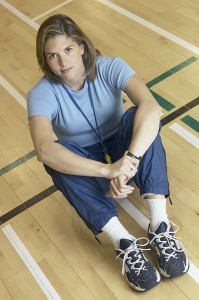The Secret Sauce of EdTech Coaching, remaining ingredients
The other day I posted about the analogy of good coaching in sports to effective EdTech coaching. The new ISTE SIGETC already has some very effective coaches as members, so I am sure they will have something to say about this analogy. I toss it out and hope I don’t have to duck rotten tomatoes from anti-sports folks.
My previous post listed fan approval, wins/losses, building learnership, and noticing/nourishing individual strengths as important characteristics for the effective EdTech coach. Here are some further ingredients to add flavor and assure success:
5. A balance of team and individual. With the excitement of molding individual talents comes the responsibility to build teamwork. A strong team of tech savvy teachers is far better than individual stars. A great EdTech coach finds ways for both stars bench warmers to work as part of TEAM. ONe great thing about EdTech is that you don’t have to limit the number of players (teachers) on the field. Everyone gets full time playing time. The effective coach finds ways for all teacher sto be engaged and contributing to the schoolwide goals of Thinking Teachers Teaching Thinkers.
6. The ability to communicate skills beyond your own. A short basketball coach could never demonstrate a slam-dunk. An English major EdTech coach knows nothing about chemistry and does not talk in chemspeak. But a good coach can find a way to talk about the skills even if he/she cannot personally DO them. A coach may understand a lot about manipulating data using technology, but have no recollection of the formulas a math or science teacher knows and challenges students to use in creating infographics. But if the coach can talk it through and communicate about the skill, the “players” who have the right skill set will pick it up and refine it as the coach suggests. A real advantage of NOT being able to “just do it” is that you will never be tempted to grab the mouse!
7. Inspiring the next generation of coaches. We see this in every sport: the kids who loved the sport come back to coach it, maybe as volunteers in a youth program or even as pro coaches. If they receive good coaching, they pay it forward. The best EdTech coaches inspire their teaching peers to do the same: volunteer to demonstrate at a staff meeting, sit side by side and help the tech-timid colleague work through a tech challenge, or simply volunteer for “pick up” tech sessions in the planning center. The best way to help teachers stay abreast of the pace of change in both teaching and technology is for all coaches to see next generation inspiration as priority one. We need many minds to keep this team in action.
Hope you’ll join the EdTech Coaches of #SIGETC in our chat January 15 at 1pm Eastern. We have future chats planned for March 19 and May 21. Start cooking up that secret sauce for #SIGETC!




